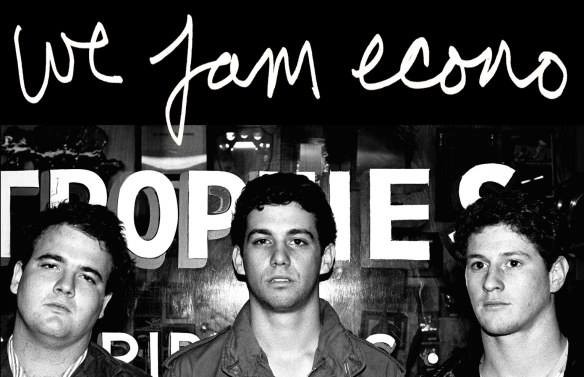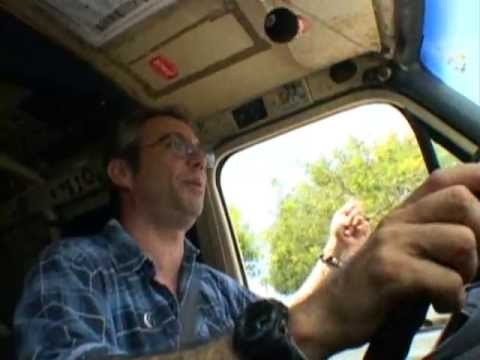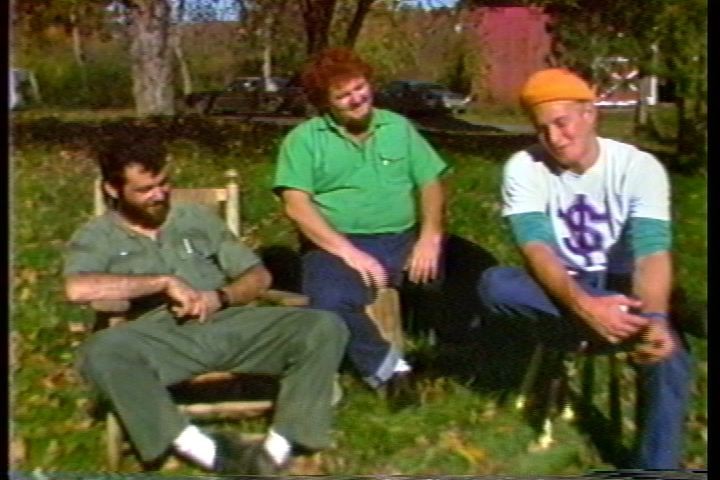For the latest installment of Never Seen It, I wanted to watch a documentary with True Story Pictures founder Joann Self-Selvidge. Self-Selvidge is a documentarian whose last film, The Keepers, (renamed See The Keepers: Inside The Zoo) which she co-directed with Sara Kaye Larson, won awards at the Indie Memphis and Nashville film festivals, and is currently available for streaming.
After going through a lengthy list of documentaries (she’s seen a lot of docs), we settled on We Jam Econo, director Tim Irwin’s 2005 documentary about American punk rock pioneers The Minutemen.

Chris McCoy: What do you know about We Jam Econo?
Joann Self-Selvidge: I know absolutely nothing about it, and I intentionally didn’t go and read the IMDB entry before we watched it. I know it’s about The Minutemen, and that’s about it.
CM: Are you a Minutemen fan?
JSS: Yes, but not as much as somebody who was slightly older than me in the 80s. I was born in 1976. I’m a fan of Mike Watt and fIREHOSE.
CM: So you are Minutemen aware.
JSS: I am definitely Minutemen aware. But I don’t have records, which would disqualify me as a fan.
CM: For the record, you were listening to Mike Watt when we got here.

Mike Watt giving director Tim Irwin a tour of San Pedro, California in We Jam Econo
91 minutes later…
JSS: 1989 was my first Antenna show. I was thirteen in 1989. By the time I was 15, I was driving. I had a Mississippi driver’s license. They would let me in, because I didn’t drink, and they knew they didn’t have to worry about me. I would go to shows by myself. I grew up in Central Gardens, I went to St. Mary’s. I went to shows really young. But I did go to a lot of the punk rock shows. Steve [Selvidge, Joann’s husband] has a hardcore background. His first gig was when he was 13 at the Antenna club.
CM: So, what did you think about We Jam Econo?
JSS: I loved it! Thank you for making me watch it.
CM: As a director of documentaries, what did you think?
JSS: I thought it was beautiful. They did a really good job setting up the characters. The editing made Mike [Watt] kind of the narrator. The way they were the central part of it, and all of the people you expected to see were on the margins. They were just commentary, they weren’t the main emphasis.
CM: Henry Rollins was in it for two shots.
JSS: I was blown away that we didn’t see Rollins or Ian McKaye until more than a half hour into the movie. And they were talking about the drummer! I saw Minor Threat and Fugazi, Dead Milkmen…that was my entry into punk. From the first shows they played, in the film, I was like, I know this. This is awesome. I love that vibe. I didn’t know The Minutemen enough to appreciate the depth of their playing. I love music documentaries, and I’m married to a musician…Punk rock was always political. That’s one of the things that I love about it. The tension between Mike Watt and D. Boon was like, ‘I want to be super political!’ versus “I want to talk about Dada and Surrealism.” Their personalities fit together like that. And the drummer, he was just like, I’m going to get a New Wave haircut. I’m going to become what people want me to become to be part of the scene. The other two were like, fuck that shit. They were totally original. They had ideas that they put into music. The thing about punk rock is, you have something to say, and you say it, and I don’t give a fuck what anybody else thinks. If those songs had been in an arena, they would have been anthemic. As it was, they were in a shitty, piss-smelling hole in the wall.
CM: That sequence when they’re in Orange County, and people are spitting on them while they’re literally playing the best music that had ever been played on that stage. That to me is like Dylan going electric at a folk festival.
JSS: He was brilliant, and everybody pissed on him…You have to do your own thing. That’s what I appreciate about them…I’d heard about this film for years, but I had never watched it.
CM: I think it’s one of the best documentaries of the twenty first century. The editing is off the charts good.
JSS: My brain was hopping to all these different music documentaries I had seen, like the Stooges documentary. I was thinking about Cream, and those 12-minute jams. How many late-60s rock docs have I seen in my life? But it also reminded me of some of the stuff Dave Grohl has done. Lost Highway, where he went back to D.C. A few years back when The Hold Steady was touring, Steve and Tad, the other guitar player, got into a Foo Fighters wormhole. The Foo Fighters documentary, even though it’s kind of slow, made me much more of a Dave Grohl fan than I ever had been before.

The Minutemen in 1985: Mike Watt, D. Boone, and George Hurley
CM: What would you take away from this about how to make a good music documentary?
JSS: I’ve seen enough music docs to have lots of good ideas, and lots of ‘stay away from this’ ideas about how to incorporate live music recording. I thought this movie did that very well. You have to have a balance, and there has to be a really good reason to include an entire song. Unless it’s only 45 seconds long.
CM: They were on their third album before they broke two minutes.
JSS: That’s a huge factor to take into account before you make a music doc. When are we going to include an entire song and slow down the narrative pace of the film? You’re lucky with this, because it’s a punk rock doc about the guys who wrote the shortest songs in punk rock. Another thing I loved is, these guys talked about some intellectually and philosophically heavy shit, because they were great artists, great thinkers, and great musicians. You have to place those moments well.
CM: So, you’re not going to get the intellectual level you get in this movie in, say, the Def Leppard documentary.
JSS: I totally disagree with you, IF you had the right interview. Any person who is capable of making a living—let alone become a rock star—has got some really radical things going on in their humanity that makes them that charismatic. You’re going to get a sound bite at some point that speaks to that. If they’re no longer living, you have to dig for it, and hope there’s enough footage so there’s something you can find. That’s why the editing in this movie is so great. And the way they incorporated the new stuff with Mike Watt…brilliant.
CM: Mike Watt is the intellectual core of American punk rock.
JSS: But I loved it that it was not all about Mike. He was presenting the story. He was a part of it, but not the whole, and I appreciated that. It could have been all about him, but it wasn’t.
Never Seen It: Watching We Jam Econo with Documentary Filmmaker Joann Self-Selvidge
